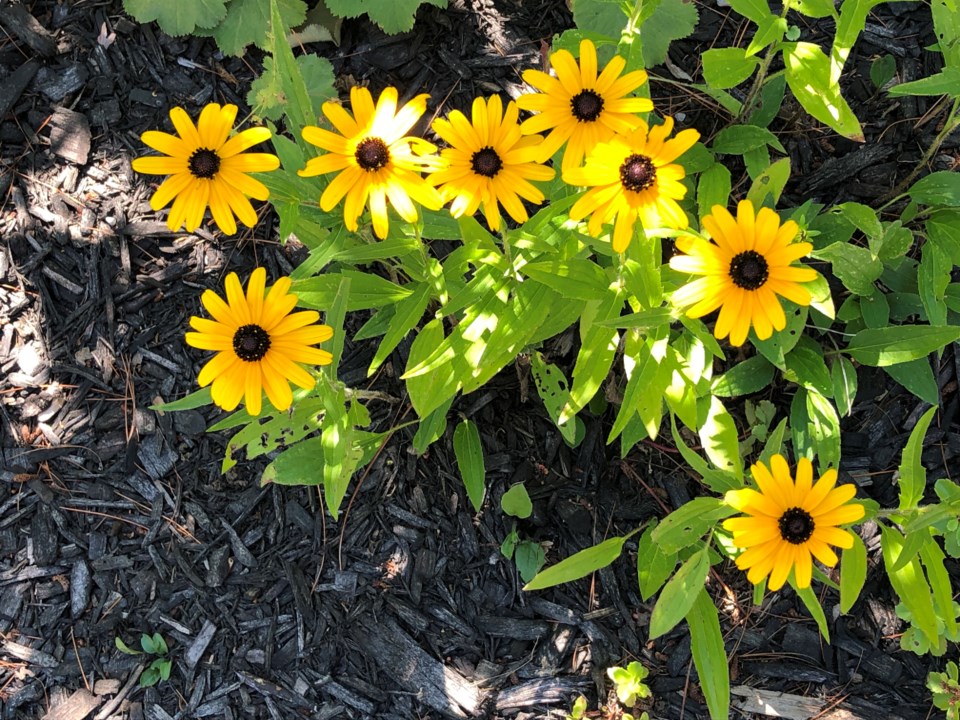Master gardener John Hethrington doesn't let a little thing like winter prevent him from working on his 20 different gardens. His advice for all gardeners is this: there's always work to be done. Here are his tips for April gardening tasks:
Make sure you have done everything you were supposed to do on the March list.
Do stretch and bend exercises before you start in the garden. I find skiing muscles have nothing to do with gardening muscles. Take it easy. There are a lot of gardening days before the ski season comes again.
I am following a new program for spreading Triple-19 fertilizer. I have learned from the Guelph-educated agronomist at the Huron Co-Op in Markdale that you should not spread 19-19-19 general-purpose fertilizer over the snow on all your flower beds and shrub borders. You will lose the nitrogen. After the snow has gone, you should spread it on the damp ground, but before plant leaves appear, so they will not be burned.
Organize your compost pile for the new season. Start a new one with the top foot of compost material from last year’s pile as a base.
As the weather warms and the ground dries, prune back perennials and ornamental grasses to one to two inches from the ground. Collect the dead material and put it on your new compost pile. Shred it, if you can.
Push any plants that the frost has heaved back into place.
Prepare garden beds for planting. Dig in compost, and/or manure, and/or other organic material around each plant. Remove any weeds that have come through from last fall. When you have cleaned up the beds, add three to four inches of mulch to control weeds this summer.
Look over your garden to determine what plants are in the wrong place or should be divided. Dig and pot up any extra plant material to contribute to the St. George’s annual plant sale, Saturday, June 3, 2023. Donate 15 or more perennials and you will receive an income tax receipt for the value your plants sell for. The drop-off date is Wednesday, May 31, from 9 a.m. until 3 p.m. at the church.
Remove rose protection. For hybrid teas, prune back to six or eight inches and apply dormant oil spray before the buds break.
Apply dormant oil spray to shrubs like euonymus that may have suffered from scale last year. Do it before the buds break.
Prepare your vegetable garden with a good digging. Add compost and manure, if you have it. Mid-month, plant the seeds of cool-weather vegetables like peas, spinach, lettuce, onions, beets. Plant seeds of frost-resistant annuals like larkspur, sweet peas and calendulas.
When dry and you can’t see your footprints, rake your lawn vigorously to remove any thatch; repair damage with weed-free topsoil. Add grass seed to bare spots. Keep moist.
Fertilize your lawn with slow-release high-nitrogen fertilizer (the first of the three numbers on the bag). Slow-release urea costs more, but it’s worth it, as it should last until the fall.
Apply crabgrass pre-emergence herbicide to your lawn, if required.
When spring finally comes, plant trees, shrubs, perennials and biennials in your garden. No need to wait until May 24 for perennials, that’s for annuals. It may be the first week in June before you can get frost-tender annuals safely into the ground.
Re-fill your pots and planters with compost. But first, put empty plastic bottles with tops at the bottom of large pots. You will need less soil and they will be lighter to move. Add slow-release plant food to the top four inches.
Then plant frost-resistant pansies now for a little spring colour.
Start mowing your lawn only as needed. Keep it long to crowd out any weeds.
Save Saturday, June 3, for the St. George’s, Anglican Parish of the Blue Mountains, giant annual plant sale on the church grounds with over 1,100 perennials and shrubs to choose from, plus free gardening advice from 599 Garden Club experts.



